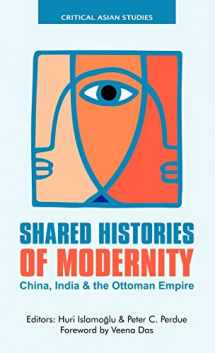
Shared Histories of Modernity: China, India and the Ottoman Empire (Critical Asian Studies)
ISBN-13:
9780415481663
ISBN-10:
041548166X
Edition:
1
Author:
Peter C. Perdue, Huri Islamoglu
Publication date:
2009
Publisher:
Routledge India
Format:
Hardcover
348 pages
FREE US shipping
Book details
ISBN-13:
9780415481663
ISBN-10:
041548166X
Edition:
1
Author:
Peter C. Perdue, Huri Islamoglu
Publication date:
2009
Publisher:
Routledge India
Format:
Hardcover
348 pages
Summary
Shared Histories of Modernity: China, India and the Ottoman Empire (Critical Asian Studies) (ISBN-13: 9780415481663 and ISBN-10: 041548166X), written by authors
Peter C. Perdue, Huri Islamoglu, was published by Routledge India in 2009.
With an overall rating of 4.1 stars, it's a notable title among other
China
(Asian History, India, Historiography, Historical Study & Educational Resources, Turkey, Middle East History, Civilization & Culture, World History, Human Geography, Social Sciences, Sociology) books. You can easily purchase or rent Shared Histories of Modernity: China, India and the Ottoman Empire (Critical Asian Studies) (Hardcover) from BooksRun,
along with many other new and used
China
books
and textbooks.
And, if you're looking to sell your copy, our current buyback offer is $0.3.
Description
While pre-modernity is often considered to be the 'time' of non-European regions and modernity is seen as belonging to the West, this book seeks to transcend the temporal bifurcation of that world history into 'pre-modern' and 'modern', as well as question its geographical split into two irreconcilable trajectories: the European and the non-European. The book examines shared experiences of modern transformation or modernity in three regions -- China, India and the Ottoman Empire -- which conventional historiography identifies as non-European, and therefore, by implication, outside of modernity or only tangentially linked to it as its victim. In other words, this work looks at modernity without reference to any 'idealised' criteria of what qualifies as 'modern' or not, studying the negotiation and legacies of the early modern period for the modern nation state. It focuses on the experience of modernity of non-European regions for they play a crucial role in the new phase of transformational patterns may have deeper roots than are generally assumed. Rejecting European characterisations of 'eastern' states as Oriental despotisms, the volume conceives of the early modern state as a negotiated enterprise, one that questions the assumption that state centralisation must be a key metric of success in modernisation. Among other topics, the book highlights: state formations in the three empires; legislation pertaining to taxation, property, police reform, the autonomy of legal sphere, the interaction of different types of law, law's role in governance, administrative practice, negotiated settlements and courts as sites of negotiation, the blurred boundaries between formal law and informal mediation; the ability of 18th century Qing and Ottoman imperial governments to accommodate diverse local particularities within an overreaching structure; and the pattern of regional development pointing to the accommodative institutional capacity of the Mughal empire. Tracing the complex histories of state or imperial formations through legal, administrative, and economic developments, the book argues that modernity as such no longer stands for experience of 'alienation' from specific historical trajectories, a characterisation which often haunted the 'modern' histories of the British empire in India, Ottoman reform state or the Communist Chinese state. Bringing together historians of the Qing, the Mughal and the Ottoman empires, this volume, principally, explores categories of historical explanation that span the European and non-European, pre-modern and modern experiences.


We would LOVE it if you could help us and other readers by reviewing the book
Book review

Congratulations! We have received your book review.
{user}
{createdAt}
by {truncated_author}


